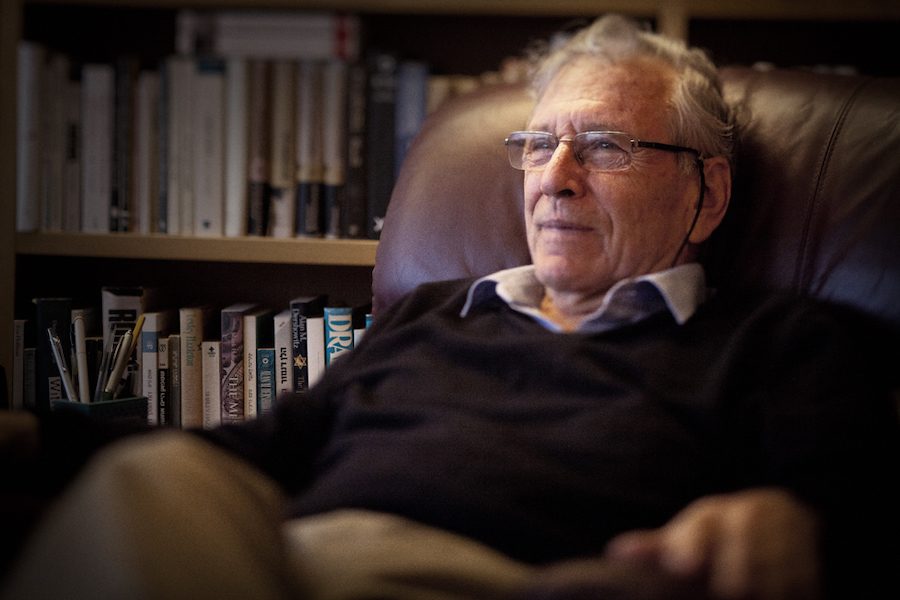Amos Oz, father of Israeli fiction, dies at 79
INFLUENCE: Oz’s 40 books, including his memoir A Tale of Love and Darkness, have been translated into 45 languages, the most among any Israeli author. BP Photo by Uzi Varon from amoz-oz.net
March 1, 2019
“When I was little, my ambition was to grow up to be a book. Not a writer,” Amos Oz wrote in A Tale of Love and Darkness.
“People can be killed like ants. Writers are not hard to kill either. But not books: however systematically you try to destroy them, there is always a chance that a copy will survive and continue to enjoy a shelf-life in some corner on an out-of-the-way library somewhere in Reykjavik, Valladolid or Vancouver.”
Oz, an Israeli author, journalist and intellectual known for his writing and open criticism of Israel, passed away on Dec. 28, but his books have already shown that they live on.
Born in Jerusalem in 1939, Oz was also a professor at Ben-Gurion University and one of the original supporters of a two-state solution. He opposed the building of settlements and identified with the Israeli Labor Party.
He was also the first prominent Israeli author, having published 40 books — among them novels, collections of short stories and novellas, children’s books and collections of articles and essays. Oz’s use of Hebrew highlighted the importance of the new language in the new state.
His most famous work was his memoir A Tale of Love and Darkness which described his struggles as a child, including his mother’s suicide. It was published in 2002.
Ms. Na’amit Nagel, who teaches that book in her SAS Jewish Literature class, described Oz as the “chronicler of that shift between European Jewry to Israeli Jewry, and skips over American Jewry because it doesn’t affect him.”
“He paints these beautiful pictures of life in Israel right at the beginning of the State,” Ms. Nagel said. “You really get a sense of what it would have been like for Holocaust immigrants to create a new life for themselves, but also the culture shock that they would have experienced.”
She said he was her favorite Israeli author.
“What I love about him is that he’s very Israeli but his writing also has a bit of a European style,” Ms. Nagel said.
She read A Tale of Love and Darkness on Yom Kippur one year.
“I haven’t been as immersed in a book since I was in high school probably,” Ms. Nagel said. “It just creates a whole world and the characters and the moments felt so real. It just paints a picture of Jewish life and culture there that you want to be apart of even if it’s not perfect.”
“His parents were European immigrants and he read a tremendous amount of the classics, and I think that style influences his writing,” she said. “I love Victorian classic literature and I always felt like there was a little bit of that in his storytelling while still being very Israeli.”
Amos Oz’s death was met by widespread comment from Shalhevet faculty.
Rabbi Daniel Bouskila, Director of the Sephardic Educational Center and a former teacher at Shalhevet, had a personal relationship with Amos Oz. They met as a result of Rabbi Bouskila inviting Oz to be a scholar-in-residence on a Friday night at Sephardic Temple Tiferet Israel, where he was rabbi at the time, in May 2006.
In an interview, Rabbi Bouskila said the two bonded over a shared appreciation for modern Hebrew literature, specifically the Israeli author Shai Agnon. They then began a snail mail correspondence because Oz did not have an email address.
They met several times after that in person, including for long discussions over coffee whenever the author found himself in any part of California.
Rabbi Bouskila previously taught the Israel Education class at Shalhevet but never discussed politics with Oz.
“Our relationship was never based on those subjects,” said Rabbi Bouskila, who is also the father of alumnus Ilan Bouskila ‘18. “I know that a very big passion and piece of his identity was to be critical of the Israeli government and many of its policies.”
Oz openly criticized the Israeli government, supporting the Labor party and creation of a Palestinian state alongside Israel.
He was famously criticized himself for reaching out to Palestinian leader and convicted terrorist Marwan Barghouti in prison, sending him a copy of A Tale of Love and Darkness with the inscription, “This story is our story, I hope you read it and understand us as we understand you. Hoping to see you outside and in peace, yours, Amos Oz.”
“I found his criticism of Israel, although I never discussed that subject with him at all, legitimate only because I find that any Israeli who lives in Israel has the democratic right to criticize their government, left or right,” said Rabbi Bouskila.
“It’s their right as Israeli citizens. We can’t claim Israel is a democracy and then not give people the right to voice their opinions.”
Rabbi Bouskila said he has plans to come into the SAS Jewish Literature as a guest lecturer to teach Amos Oz’s work.
Dean of Students Rabbi Schwarzberg took to Schoology on Dec. 30 to inform students of Oz’s passing since it had happened during winter break. He focused on Oz’s politics.
“To be sure, his politics were considered controversial within the Israeli and Jewish community,” Rabbi Schwarzberg wrote. “But there are incredible quotes and interviews where he professes a profound commitment and belief in the aspirations and values of the state of Israel, despite being concerned with some of its policies.
“No matter the case, over the last 48 hours, those on the Right and Left are mourning his loss and recognizing the impact he’s had on Israeli culture, thought, and politics.”
While Oz is not in the Israel Education curriculum, his political ideology is closely aligned with an article that is.
Israel Education teacher Ms. Hannah Cohen commented on Rabbi Schwarzberg’s Schoology post, highlighting that Oz’s approach to Israel is similar to that of Shalhevet’s Lahav curriculum.
One article taught in the Israel Education part of Lahav is “Mature Zionism: Education and the Scholarly Study of Israel,” by Hanan Alexander, Professor of Philosophy of Education at the University of Haifa. It describes the idea that while one should support Israel wholeheartedly, it is important to call Israel out when they make a mistake.
“One of my favorite Amos Oz quotes is […] ‘I love Israel even in times I don’t like it,’” Ms. Cohen wrote. “It speaks to the Mature Zionist lens we have been learning about in our 11th grade Israel education class.”
Oz won more than 20 awards throughout his career including the 1976 Brenner Prize — the Israeli literary prize given by the Hebrew Writers Association in Israel and the Haft Family Foundation, the 1998 Israeli Prize for literature and a 2015 Park Kyong-ni Prize, a South Korean award that comes with $100,000.
In one of many tributes written around the world after his death, Gal Beckerman of the New York Times described Oz as “a sort of of sociologist and psychologist of the Israeli soul.”
“It’s an extraordinary book that will endure as one of the greatest works in modern Hebrew,” Beckerman wrote of Tales of Love and Darkness.
“In many ways, through this memoir, Mr. Oz perfected what he had tried to do again and again in his fiction — to capture the coming together of the personal and the political, with neither of the two elements suffering from the collision.”
Get the latest from The Boiling Point. Sign up for our news feed.














